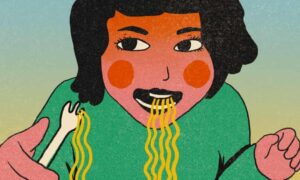
On 14 May 2019, I went to my old school, Richmond elementary, in Portland, Oregon, for a special lunch. It was the first districtwide yakisoba day, when every school would serve wheat noodles tossed with roasted vegetables. And not just any noodles: they were from a recipe that I’d developed for the school system’s 16,000-plus students who eat school lunch.
As I helped dish our noodles on to trays, I could hear excited kids lining up. Soon, to my absolute wonder, I heard them chanting, “Ya-ki-so-ba! Ya-ki-so-ba!” In that moment, I felt more connected to my community than I’d ever felt before.
My business’s noodles made it into every Portland school cafeteria that day due to parents who campaigned for good, culturally relevant food for their kids; a school system employee who wanted the same; and not least of all, Oregon state funding.
I grew up studying Japanese in Portland’s public schools and wanted to give back to the Japanese American community that had educated me. In 2016, my mom, a friend and I launched a noodle business called Umi Organic. I suggested the name umi – the Japanese word for “ocean” – to express the dynamic currents that tie Japan and Oregon together. Today, we sell fresh organic ramen and yakisoba noodles to groceries and restaurants up and down the west coast.
Richmond is a Japanese-language immersion school. Around 2015, Japanese parents began taking over lunch a few times a year to extend classroom lessons to the cafeteria. Yakisoba was their biggest hit. Whitney Ellersick, the nutrition services senior director of Portland public schools, noticed. In 2018, she asked if Umi would develop a fresh, wholegrain-rich yakisoba noodle to meet federal nutrition guidelines. Her other noodle option, she told me, was gummy and unappetizing.
